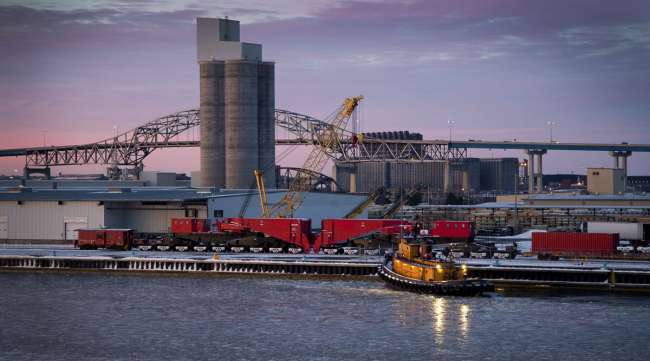Chicago Tribune
Mariners Take Extra Precautions as Great Lakes Shipping Season Begins

[Stay on top of transportation news: Get TTNews in your inbox.]
As the coronavirus pandemic locked down countries and disrupted global supply chains, the Great Lakes shipping season got underway last week.
American and foreign freighters are expected to transport cargo throughout the more than 100 ports of call in the region, according to U.S. Customs and Border Protection and industry leaders.
But the sailors aboard these fleets are adhering to new protocols and precautionary measures to prevent contraction and spread of the virus.
The Coast Guard will be checking for cargo vessels — whether American or foreign — that have recently traveled to an area impacted by a coronavirus outbreak within the last 14 days.
These ships will be allowed to enter U.S. ports so long as they do not have a sick crew member, according to Petty Officer Brian McCrum, spokesman for the Coast Guard’s 9th District, which oversees the Great Lakes region. Once docked, crew members will be required to stay aboard these vessels, except for essential activities such as loading or unloading cargo and gathering provisions.
Chicago is a hub for national and international freight. More tonnage of cargo moves through the Illinois International Port District than any other port in the Great Lakes. Based at Calumet Harbor, the port district handles goods hauled by ocean-faring freighters through the St. Lawrence Seaway and also ships traveling through the Mississippi River to the Gulf of Mexico.
The shipping industry is implementing a number of safeguards, according to James Weakley, president of the Lake Carriers Association, an organization that represents 46 American vessels that move 90 million tons of cargo annually across the Great Lakes.
Companies are screening sailors before they report to work, inquiring about recent travel and contact with others. Many crews have been ordered to sanitize work stations with bleach solution and even stagger times to eat meals to maintain distance from fellow crew members.
Sailors have been warned to limit physical contact with dockworkers and other personnel onshore as much as possible.
“We’re enforcing hygiene guidelines and social distancing aboard the ships as if it was a safety rule,” Weakley said. “So anybody who violates some of those guidelines is violating a safety rule. Not only are there formal ramifications, but there is a very informal peer pressure among our sailors that will keep people from doing anything that is unsafe and potentially cause spread.
“The upside is, once we’re underway and sailing, and everyone is healthy, these ships could be potentially the safest places in the world.”
While U.S. and Canadian ships began hauling materials through Great Lakes locks on March 25, the international shipping season has been delayed due to flooding on Lake Ontario. Officials who regulate the dam are releasing as much water as possible through the St. Lawrence River to alleviate flooding, which will make for potentially perilous currents for incoming ships.
Foreign vessels are allowed to enter the St. Lawrence as of April 1.

A Canadian freighter ship arrives to unload salt at the Port of Duluth-Superior in Duluth, Minn., in January 2012. (Ariana Lindquist/Bloomberg News)
The outbreak will also require adjustments by international fleets, according to Stuart Theis, executive director of the United States Great Lakes Shipping Association, a group representing foreign vessels. Not only have infections been reported in at least 175 countries and territories, but the virus has gripped many Great Lakes states, including New York, Illinois and Michigan.
“You’ve got guys from Poland or wherever, who, as soon as they get to a U.S. port, they want to go to Kmart or Walmart to buy jeans and do all kinds of touristy stuff,” Theis said. “And there’s got to be a lot of limitations put on these guys — and maybe for their own good — in terms of exposure to the virus.”
But supplies carried by fleets are essential to economies and daily life, including iron ore for steelmaking, cement for construction, coal for power plants, among many other raw materials.
Many companies that rely on Great Lakes shipping typically receive stockpiles before ice forms in the winter. By the spring, these businesses need to replenish supplies.
Transportation of these commodities is considered essential travel and allowed.
However, some shipping experts worry that an economic downturn could lead to less shipping this season. So far, it’s too early to tell.
In the meantime, industry leaders such as Weakley, of the Lake Carriers Association, have consulted with the Centers for Disease Control and Prevention and Coast Guard for best practices and guidance.
With no epidemic in recent memory to compare this to, Weakley found himself browsing through documents providing guidance during the H1N1 flu from more than a decade ago.
But even then, there wasn’t the type of impact on businesses, travel and everyday life like there is now.
“This is unprecedented during my lifetime,” Weakley said.
Want more news? Listen to today's daily briefing:
Distributed by Tribune Content Agency, LLC




